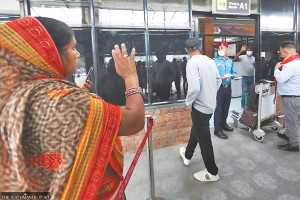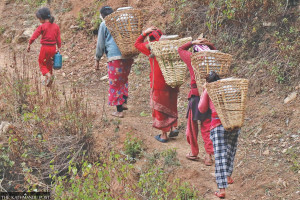 18.12°C Kathmandu
18.12°C KathmanduMiscellaneous
A small, well-lighted place
Shanta Rimal’s immediate dream is to own a tea shop: she figures it will help her get by.Rimal is a mother of two daughters and was abandoned by her husband five years ago because she was the mother of only two daughters—she couldn’t bear him sons. Her husband is now married to a local from their village and does not care forShanta or the daughters.
Shanta Rimal’s immediate dream is to own a tea shop: she figures it will help her get by.Rimal is a mother of two daughters and was abandoned by her husband five years ago because she was the mother of only two daughters—she couldn’t bear him sons. Her husband is now married to a local from their village and does not care for
Shanta or the daughters.
Originally from Nuwakot, Rimal, 34, is now in Kathmandu going from pillar to post in an attempt to get financial help from the government that will help her set up a teashop.
“I do not want to be dependent on anyone. I want to use the money earned from selling tea to raise my daughters properly,” says Rimal. “For that, I have sought help from many people but to no avail. I even knocked on the doors of the prime minister’s office.”
In June this year, Rimal, along with a dozen other single women, had approached the prime ministerand the Ministry of Women and Children, asking that they be granted a petty funds loan. All of them wanted to start small businesses to eke out a living.
“But we have not received any response so far,” says Rimal.
The women found each other in the days after the earthquakes hit, earlier this year. They were all living in makeshift camps in Tundikhel when they ran into one another. As they got talking, they realised that all of them suffered from the same
problems. They discussed ways that would help them get back on their feet. Most of them had been street tea vendors before the quake displaced them—meaning they would lug around flasks of tea and bags of biscuits, which they would sell them to customers in public spaces such as Ratnapark, the New Bus Park and Ason. The money they earn by vending tea in that manner barely enough to pay the rent, and now that their kids are growing up, they want to be able to make enough income that will pay for school and other expenses. Almost all of them are either separated from their husbands or are widows.
They believe that owning their own shop will also allow them to escape the wrath of the Metropolitan Police, who routinely take away all of their goods, leaving them with nothing to sell.
The women learned from other campers in Tundikhel that the government has petty cash loan scheme for women who want to start their own businesses. But because they do not have political connections, they say that when they approached officials in government banks in Kathmandu, they were not able to procure loans. They were told that they actually needed to put up collateral to get the loans. But because the women do not have property in their name—the property is either in the name of the husband or the husband’s family—they came up empty.
Finally, desperate, and with nowhere to turn to, they came up with a plan to catch the attention of the prime minister and see if a top-down approach might finally do the trick.
The women sent a letter to the Prime Minister’s Office and also to the Ministry of Women, Children and Social Welfare. In letter they informed the authorities about their condition and about their plans to open up a vegetable, tea or fruit shop.
“We are not important people so we knew the prime minister would not grant us audience. But someone from his office said that our letter had been received and that we would be informed if something could be done for us, but we have not heard from him since,” says Rimal.
That the women had to take their case all the way to Prime Minister’s Office shows that the government’s petty funds loan scheme for women entrepreneurs has not been created to cater to the needs of single women and widows. For women who have no collateral, they can band together with other similar women and form a group and thus get loans from government microfinance institutions. The problem with that provision is that the women all have to hail from the same locality. According to Binod Atreya, the executive director of Nepal Rastra Bank, that provision was created to ensure that when women take out a loan as a group, their being residents of the same place would allow them to check up on each other and encourage every member to pay back the loan. The problem is that in Rimal’s group, the women’s villages are scattered across Nepaltaraithey hail from villages in Dhading, Sindhupalchok, Kavre and Nuwakot. They only got together because they sell tea in Kathmandu.
Lily Thapa, the founder of Women for Human Rightstaraian NGO working on behalf of single womentaraisays that the government’s rules for loan procurement does not take into account the ground realities as lived by single women. “Many women will of course leave their villages and migrate to more urbanised locations in search of work. The petty funds loan provision fails to take that into account.”
It also does not take into account the fact that women might not want to remain back in their village for other reasons. Sanu Tamang, a member of Rimal’s group who hails from Dhading, does not want to work in her village because her husband was murdered there.
“That place has bitter memories for me, and moreover I do not want my son to grow up in that environment. But I am willing to work hard. I’d like to start a small business so that my son does not have to live in the village,” says Tamang, 50, whose son is ten years old.
“The fundamental problem with how the government approaches women is that many of the people who create rules on behalf of women don’t understand how single women have it so hard in this country,” says Thapa. “They cannot lay claim to property that was owned by the family. Many do not have access to people in power—at any level of the bureaucratic hierarchy. And in the case of women whose husbands leave them, the husband’s family usually does not want anything to have with them. They are left to fend for themselves and even attempting to start something as small as a tea shop becomes a Herculean challenge they cannot overcome.”










.jpg&w=300&height=200)



